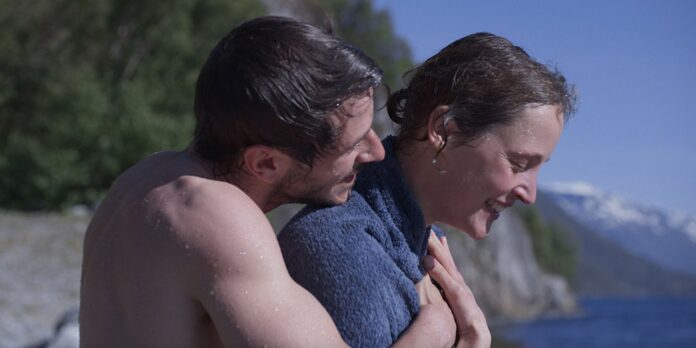THE STORY – Hélène and Mathieu have been happy together for many years. The bond between them is deep. Faced with an existential decision, Hélène travels alone to Norway to seek peace, an act that will test the strength of their love.
THE CAST – Vicky Krieps & Gaspard Ulliel
THE TEAM – Emily Atef (Director/Writer) & Lars Hubrich (Writer)
THE RUNNING TIME – 123 Minutes
The premise of Emily Atef’s film “More Than Ever” is a deceptively simple one. Hélène (Vicky Krieps) is a 30-something-year-old woman who has been diagnosed with IPF, a rare lung disease with no known cure. When she finds a blog written by a man known as “Mister” who has pancreatic cancer, she decides to leave behind her home and attentive husband Mathieu (Gaspard Ulliel) to set out on a spontaneous trip to stay with “Mister” in his home in rural Norway.
But this is not another tear-jerker that attempts to find a bittersweet beauty in chronic illness. From its first shot, “More Than Ever” promises to confront its viewers not only with the difficult concept of our own mortality but also the very real emotional and practical complexities that come with it. Framed within a doorway, it’s a painfully claustrophobic shot that boxes Hélène into her surroundings and her failing body. She looks at herself in a full-length mirror as she gets dressed. The phone rings, but she can’t bring herself to answer. She looks at her body again and breaks down in tears. Cut to a shot of dark waves and screeching seagulls, the polar opposite of Hélène’s surroundings.
The first quarter of the film reveals the oppressive nature of Hélène’s life with IPF. Through a series of snapshots, we see just how out of place she has become in her old life. She sits silently through a humiliating dinner party as her friends tiptoe around her illness fearfully. She can’t make love to her husband without having a coughing fit. She tries to chat with her weeping mother over Zoom. She learns that her best hope is an extremely dangerous double lung transplant. Her only respite is “Mister,” the blog of a Norwegian man with cancer. Eventually, it becomes too much. “Right here, all I do is wait,” she explains to her husband. Ignoring his pleas, she sets off for Norway alone.
Norway proves to be a sharp contrast. “Mister,” or Bent as his real name turns out to be, lives an almost hermetic lifestyle in a cabin by a lake. The landscape is vast and rugged. The midnight sun means daylight pours through her window 24 hours a day. Her days are quiet and simple and stripped back.
The striking difference between Atef’s tight shots of Hélène’s home in France and her grandiose shots of the immense Norwegian landscape mirrors Hélène’s internal journey—a journey from feeling suffocated by her physical body to accepting its decline and regaining control. “I think I understand something important,” she tells Mathieu over the phone from Norway. “The nature, the sky, the wind, and the constant light, it’s like a shock, and at the same time, it’s comforting, it’s reassuring. I suddenly feel very aware of my body. I feel present within my body.” She chooses not to have the lung transplant and, in doing so, chooses to spend the time she has left on her own terms.
“More Than Ever” is a quiet, slow, thoughtful film that occasionally threatens to drift a little too far into the realm of philosophical rumination. So focused is Atef on the thematic elements at play we sometimes miss out on the specificity of character and practical plot development. However, Krieps ensures that Hélène’s quiet emotional life never veers into emotional pastiche. Rather, from moment to moment, the character’s experience remains exactingly specific. As her husband Mathieu, Ulliel, who died tragically in a ski accident earlier this year, gives a similarly detailed portrayal of a man grasping to hold onto his wife as she tries to convince him to let go.
An unrelentingly contemplative film, “More Than Ever” still packs a surprising emotional punch. Ultimately, it leaves us with no choice but to ponder what it means to mourn a future that can no longer be lived and what it means to take that imagined future from those around us.


